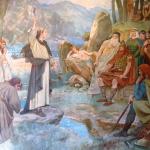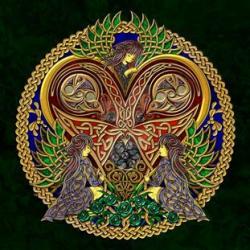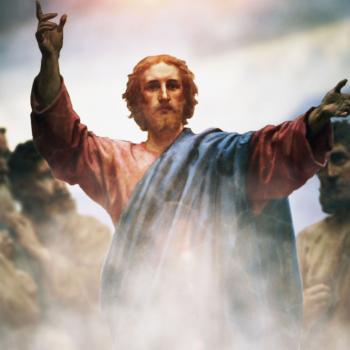In this world, and at this moment, we are surrounded by death. And although the Corona Virus is adding to this death toll, the reality is that death is all around us. In the modern church there seems to be a stigma with death and dying. I believe this is because in the modern era, we do not see as much death as occurred around those who wrote the following poem. The rate of stillbirths was astronomical, and most adults did not live past their 50’s. Average life expectancy in the 6th Century was around 33. It is not a stretch to say that death was common part of life at the time these Celtic poems and prayers were pinned.
Death in a Positive Light?
The pervasiveness and suddenness of death in the Celtic world was staggering. Because of the nearness and reality of death, Celts viewed death as not only natural but in a positive light for the one who had passed. And although we know little of the Celts beliefs and practices before Christianity, we do know some about the afterlife. The Celts carried with them this afterlife belief into a Christianity that believed immensely of a heaven where they would go after death. Because the missionaries that went to Ireland like Patrick were more interested in the integration of culture, rather than its destruction, Celtic culture under Christianity thrived in its early years.
The Celts saw death in a positive light because they viewed the afterlife as a place far better than the war torn, disease infested place they currently resided in. This was a common theme amongst other belief structures of the ancient world. Greece and Rome had Elysium, and the Vikings had Valhalla. The Celts had the Delightful Plain.
The Delightful Plain, The Irish “Heaven”
In the Delightful Plain the Celts believed in a country where there was no sickness, old age, or death, where happiness lasted forever, and a hundred years was as one day. This mimics the heaven of Christianity as seen in scripture:
“Therefore, they are before the throne of God, and serve him day and night in his temple; and he who sits on the throne will shelter them with his presence. They shall hunger no more, neither thirst anymore; the sun shall not strike them, nor any scorching heat. For the Lamb in the midst of the throne will be their shepherd, and he will guide them to springs of living water, and God will wipe away every tear from their eyes.” (Revelation 7:15-17)
The Soul Leading
So, understanding that the Celts viewed death as a mercy rather than a punishment, it makes since that they would have poems and blessings for those that had passed away, or “crossed the veil” as some might say. This Beannachadh Bais or “Death Blessing” was one of many spoken upon the deathbed of a friend or loved one as they lay dying:
The poor soul is now set free,
Outside the soul shrine,
O kindly Christ of the free blessing,
Encompass Thou my love in time
Be this soul on Thine arm, O Christ,
Thou king of the City of Heaven, Amen
Since Thou, O Christ, it was who bought this soul,
Be it peace on Thine own keeping, Amen
Water from an Ancient Well
So, what can we learn from a soul blessing? What could this blessing teach us hundreds of years removed from its original speakers? The first thing we can learn is something the Bible already tells us: Death is not the end. Although it is very painful for the ones left behind, the fact is the soul has left its earthly shrine and resides with The Father. It also teaches us that when we die, we will be encompassed in love. We no longer will have the mortal veil to separate us and God. The true meaning of Emmanuel, “God with us” is realized in death. It teaches us that death is a gift.
In the world today, where the life expectancy is in the 60’s and 70’s and dying at 33 is considered tragic, we view death as punishment. The reality is, we will never be fully encompassed with the love of God until death. The Celts teach us the reality of death as a blessing and a gift. We do not view it this way because it is not us doing the dying. We are left with holes in our hearts from the departed. And this is the final and most important lesson that death blessings teach us: Its not about you.
Death is Necessary?
We have a habit of making things about us. When a tragedy occurs, we instinctively focus on how it has affected us. But the death blessing teaches us to put others before ourselves, even in death. We are taught the valuable lesson of moving away from the center of who we are and our desires. We are taught to move to the center of Jesus Christ, away from ourselves. It reminds us that even in our suffering at the loss of a loved one, God will encompass the passed on with love. And for all those left behind, God promises us they truly are in a better place and can not wait to meet us there!











